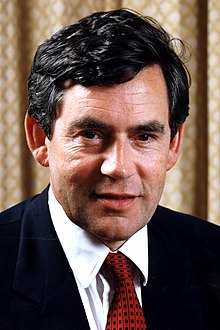 Brown's chancellorship portrait | |
| Chancellorship of Gordon Brown 2 May 1997 – 27 June 2007 | |
| Party | Labour |
|---|---|
| Election | 1997, 2001, 2005 |
| Nominated by | Tony Blair |
| Appointed by | Elizabeth II |
| Seat | 11 Downing Street |
|
| |
| ||
|---|---|---|
|
Shadow Chancellor
Chancellor of the Exchequer
Policies
Prime Minister of the United Kingdom
Post–Prime Minister
Bibliography
|
||
Gordon Brown served as Chancellor of the Exchequer of the United Kingdom from 2 May 1997 to 27 June 2007. His tenure was marked by major reform of Britain's monetary and fiscal policy architecture, transferring interest rate setting powers to the Bank of England, by a wide extension of the powers of the Treasury to cover much domestic policy and by transferring responsibility for banking supervision to the Financial Services Authority. Brown presided over the longest period of sustained economic growth in British history.[1][2] He had previously served as Shadow Chancellor of the Exchequer in Tony Blair's Shadow Cabinet from 1994 to 1997. As Shadow Chancellor, Brown as Chancellor-in-waiting was seen as a good choice by business and the middle class.
Brown was appointed chancellor by Prime Minister Tony Blair following Labour's victory in the 1997 general election, its largest landslide general election victory in history, and served in the role throughout Blair's premiership. One of Brown's first acts as chancellor was to grant the Bank of England the freedom to set the UK's interest rate, a decision that had previously been the responsibility of the chancellor. Brown was reappointed chancellor following Labour's landslide victory in the 2001 general election, and won a third term after the party also won the 2005 general election, though with a vastly reduced majority.
During his chancellorship, Brown outlined five economic tests, which resisted the UK adopting the euro currency. Controversial moves included the abolition of advance corporation tax (ACT) relief in his first budget,[3][4] the sale of UK gold reserves from 1999 to 2002, and the removal in his final budget of the 10% starting rate of personal income tax which he had introduced in 1999.[5] In 2007, Brown was succeeded as chancellor by Alistair Darling the day after Brown succeeded Blair as Labour Party leader and prime minister, following Blair's resignation.[6]
Brown's ten years and two months as Chancellor of the Exchequer set several records. He was the longest-serving Labour Party Chancellor of the Exchequer ever, beating Denis Healey, who was Chancellor for 5 years and 2 months from 5 March 1974 to 4 May 1979. On 15 June 2004, he became the longest continuous serving Chancellor since the Reform Act 1832, passing the figure of 7 years and 43 days set by David Lloyd George (1908–1915). However, William Ewart Gladstone was Chancellor for a total of 12 years and 4 months in the period from 1852 to 1882 (although not continuously).
Brown stated his chancellorship had seen the longest period of sustained economic growth in UK history,[7][8] although part of this growth period started under the preceding Conservative government under John Major in 1993, and the details in Brown's growth figures have been challenged,[9][10] as have his more general claims to have created the conditions for prosperity and declining poverty levels.[citation needed]
- ^ "Budgeting for stable economic growth". www.esrcsocietytoday.ac.uk. Archived from the original on 28 May 2007.
- ^ Glover, Julian (17 March 2005). "His record – 304 years and counting". The Guardian. London. Archived from the original on 22 September 2007. Retrieved 28 April 2010.
- ^ Halligan, Liam (16 October 2006). "Brown's raid on pensions costs Britain £100 billion". The Daily Telegraph. Archived from the original on 9 February 2009. Retrieved 27 February 2009.
- ^ Stewart, Heather (22 July 2002). "Pension blame falls on Brown". The Guardian. Archived from the original on 6 December 2008. Retrieved 4 August 2008.
- ^ Dawar, Anil (21 April 2008). "Q&A: 10p tax rate cut". The Guardian. Archived from the original on 25 April 2008. Retrieved 4 August 2008.
- ^ "A reborn Gordon Brown could be the man who saved the union". Financial Times. 17 September 2014. Archived from the original on 21 September 2014. Retrieved 19 September 2014.
- ^ "Budgeting for stable economic growth" Archived 28 May 2007 at the Wayback Machine
- ^ Glover, Julian (17 March 2005). "His record – 304 years and counting". The Guardian. London. Retrieved 28 April 2010.
- ^ Thornton, Philip (17 March 2005). "Sleight of hand fails to hide gaping holes in public purse". The Independent. London. Archived from the original on 12 October 2007. Retrieved 28 April 2010.
- ^ "Election fact check: Economic growth". BBC News. 8 April 2005. Retrieved 28 April 2010.
© MMXXIII Rich X Search. We shall prevail. All rights reserved. Rich X Search


